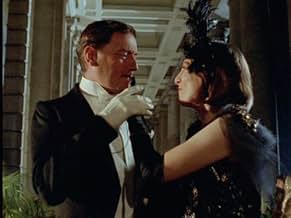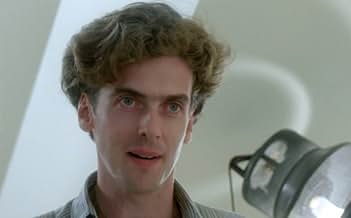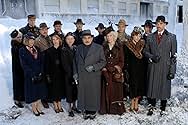Os casos do excêntrico, mas agudo, detetive belga Hercule Poirot.Os casos do excêntrico, mas agudo, detetive belga Hercule Poirot.Os casos do excêntrico, mas agudo, detetive belga Hercule Poirot.
- Indicado para 1 Primetime Emmy
- 6 vitórias e 17 indicações no total
Explorar episódios
Resumo
Reviewers say 'Poirot' is acclaimed for David Suchet's definitive portrayal of Hercule Poirot and high production values. The series is celebrated for faithful adaptations, engaging supporting performances, and an elegant 1930s setting. Common praise includes clever plotting and Poirot's charm. However, criticisms note formulaic episodes, predictability, and creative liberties in later seasons. The darker tone in final seasons receives mixed reactions, with some feeling it detracts from the original charm.
Avaliações em destaque
Granada Television scored another hit with David Suchet's faithful delineation of the irritating little habits and precise fastidiousness of Agatha Christie's Hercule Poirot to provide the most credible interpretation to date. The same production company had also been responsible for the earlier extremely watchable Sherlock Holmes series with the incomparable Jeremy Brett. Although Sir Peter Ustinov gave colourfully entertaining performances in various movie and TV dramatisations (`Death on the Nile', `Evil Under the Sun', etc.) his pompous Belgian detective always seemed too large and gregarious to be convincingly possessed of all the little foibles of Christie's narratives.
Hugh Fraser is appropriately laid back as Poirot's companion, Captain Hastings, in noticeable contrast to his more commanding Wellington in the enjoyable and successful ITV dramatisations of Bernard Cornwell's Sharpe novels. A convincing Chief Inspector Japp is provided by Philip Jackson who, whilst in respectful awe of Poirot still attempts to promote Scotland Yard as other than the implied bunch of duffers most famous fictional private detectives encounter. Pauline Moran played the ever-efficient assistant Miss Felicity Lemon. Other than these four constants, a host of guest actors, directors, scriptwriters and cinematographers were involved in the series to provide a variety of storylines and styles. Over the past decade Carnival Films amongst others have also made various one-offs with the same key cast.
The two episodes I have seen recently, and first shown in February 1989, seem to particularly warrant some observation on their themes. `The Third Floor Flat' makes a tongue-in-cheek comment on The Queen of Crime' herself with Poirot losing his bet with Hastings to detect the murder culprit in an amateurish theatrical play, as the writer (whom Poirot dismisses as `an imbecile') does not reveal all the facts until the wily detective on the stage has exposed the perpetrator to an assembled gathering of the usual suspects. In this instalment the motive for the inevitable murder is given as the absurdly flat refusal by one spouse to grant a divorce to the other, a common mechanism of Christie's that is rather extreme and not wholly satisfying. This episode is also notable for a rare display of emotion by Hastings when he is visibly shaken after his beloved vintage car is wrecked, and Josie Lawrence makes a guest appearance in one of her first straight roles after the comic improvisations of `Whose Line Is It Anyway'.
Fine photography and attention to detail prevail to create a nostalgic impression of 1930's London although there is not much evidence of the Great Depression affecting this particular society. There is a superb evocation of the art deco period with the Mansion flats being particularly impressive and similar to those found around Marylebone.
`Triangle at Rhodes' affords Poirot a chance to escape the London scene and his usual crowd, and provides us with a travelogue promotion, whilst also touching on attitudes to divorce. With her boyish husband (Peter Settelen) seemingly besotted with the archetypal femme fatale, Valentine Chantry (Annie Lambert) on her fifth marriage, Marjorie Gold (Angela Down; `Emma') makes a deliberately misleading impassioned proclamation on the ease of divorce in the 1930's claiming she is from the old fashioned generation that doesn't believe in it or holds with the modern attitude to life of `easy marriage, easy divorce.' If divorce was that easy then it is a contradiction to Christie's often used plot device for removing stubbornly recalcitrant partners. Although divorce was a painful experience for Dame Agatha herself in 1928 (with her husband's affair leading to her notorious disappearance for eleven days in 1926, the subject of Michael Apted's stylish 1979 film `Agatha') she does not address the issues with any feeling, only using it as a contrivance, unlike Charles Dickens some 70 years earlier in the 19th century with his social commentary in `Great Expectations', when there was little scope for women caught in an abusive marriage. With Italian troops occupying Rhodes there is some recognition of history as Poirot passes on his observation of the strengthening of harbour defences to a highly improbable MI5 type, ineffectively trying to hide as a harmless Major (Timothy Knightley) by paying unreciprocated attention towards another English hotel guest (Frances Low) holidaying on her own, who in turn seeks Poirot's protection.
Incidentally with 2001 being the 25th anniversary of Dame Agatha's death on 12 January 1976 her books are being relaunched by HarperCollins and the Palace Theatre in Westcliff-On-Sea, Essex has dedicated a festival season to all 23 of her plays.
The original Granada series is available in DVD and VHS tape formats from Amazon and Britannia Music.
Hugh Fraser is appropriately laid back as Poirot's companion, Captain Hastings, in noticeable contrast to his more commanding Wellington in the enjoyable and successful ITV dramatisations of Bernard Cornwell's Sharpe novels. A convincing Chief Inspector Japp is provided by Philip Jackson who, whilst in respectful awe of Poirot still attempts to promote Scotland Yard as other than the implied bunch of duffers most famous fictional private detectives encounter. Pauline Moran played the ever-efficient assistant Miss Felicity Lemon. Other than these four constants, a host of guest actors, directors, scriptwriters and cinematographers were involved in the series to provide a variety of storylines and styles. Over the past decade Carnival Films amongst others have also made various one-offs with the same key cast.
The two episodes I have seen recently, and first shown in February 1989, seem to particularly warrant some observation on their themes. `The Third Floor Flat' makes a tongue-in-cheek comment on The Queen of Crime' herself with Poirot losing his bet with Hastings to detect the murder culprit in an amateurish theatrical play, as the writer (whom Poirot dismisses as `an imbecile') does not reveal all the facts until the wily detective on the stage has exposed the perpetrator to an assembled gathering of the usual suspects. In this instalment the motive for the inevitable murder is given as the absurdly flat refusal by one spouse to grant a divorce to the other, a common mechanism of Christie's that is rather extreme and not wholly satisfying. This episode is also notable for a rare display of emotion by Hastings when he is visibly shaken after his beloved vintage car is wrecked, and Josie Lawrence makes a guest appearance in one of her first straight roles after the comic improvisations of `Whose Line Is It Anyway'.
Fine photography and attention to detail prevail to create a nostalgic impression of 1930's London although there is not much evidence of the Great Depression affecting this particular society. There is a superb evocation of the art deco period with the Mansion flats being particularly impressive and similar to those found around Marylebone.
`Triangle at Rhodes' affords Poirot a chance to escape the London scene and his usual crowd, and provides us with a travelogue promotion, whilst also touching on attitudes to divorce. With her boyish husband (Peter Settelen) seemingly besotted with the archetypal femme fatale, Valentine Chantry (Annie Lambert) on her fifth marriage, Marjorie Gold (Angela Down; `Emma') makes a deliberately misleading impassioned proclamation on the ease of divorce in the 1930's claiming she is from the old fashioned generation that doesn't believe in it or holds with the modern attitude to life of `easy marriage, easy divorce.' If divorce was that easy then it is a contradiction to Christie's often used plot device for removing stubbornly recalcitrant partners. Although divorce was a painful experience for Dame Agatha herself in 1928 (with her husband's affair leading to her notorious disappearance for eleven days in 1926, the subject of Michael Apted's stylish 1979 film `Agatha') she does not address the issues with any feeling, only using it as a contrivance, unlike Charles Dickens some 70 years earlier in the 19th century with his social commentary in `Great Expectations', when there was little scope for women caught in an abusive marriage. With Italian troops occupying Rhodes there is some recognition of history as Poirot passes on his observation of the strengthening of harbour defences to a highly improbable MI5 type, ineffectively trying to hide as a harmless Major (Timothy Knightley) by paying unreciprocated attention towards another English hotel guest (Frances Low) holidaying on her own, who in turn seeks Poirot's protection.
Incidentally with 2001 being the 25th anniversary of Dame Agatha's death on 12 January 1976 her books are being relaunched by HarperCollins and the Palace Theatre in Westcliff-On-Sea, Essex has dedicated a festival season to all 23 of her plays.
The original Granada series is available in DVD and VHS tape formats from Amazon and Britannia Music.
Poirot is an excellent tv series, with great production values and an outstanding cast.
The only bad thing I can say about it is that I've already seen every episode 5 times, and remember how they all end.
David Suchet is excellent as the refined, French speaking (Walloon) Belgian detective of the title. On all his cases, he is ably assisted by his Watson, Captain Hastings, and his secretary Miss Lemon. The series is set in the thirties, and the characters still carry the scars of the first world war with them, while at the same time omens of the next conflict are ever present. A fourth member of the cast is their modern Art Deco apartment building. The jazzy score gives an extra feeling for the period.
Anyway, if you haven't seen this little gem already, don't miss it. It is as good as Agatha Christie's other detective series Miss Marple, with Joan Hickson.
The only bad thing I can say about it is that I've already seen every episode 5 times, and remember how they all end.
David Suchet is excellent as the refined, French speaking (Walloon) Belgian detective of the title. On all his cases, he is ably assisted by his Watson, Captain Hastings, and his secretary Miss Lemon. The series is set in the thirties, and the characters still carry the scars of the first world war with them, while at the same time omens of the next conflict are ever present. A fourth member of the cast is their modern Art Deco apartment building. The jazzy score gives an extra feeling for the period.
Anyway, if you haven't seen this little gem already, don't miss it. It is as good as Agatha Christie's other detective series Miss Marple, with Joan Hickson.
David Suchet is absolutely the best Hercule Poirot I have ever seen. He personifies the Hercule in Agatha Christie's books perfectly. Also, Hugh Fraser (Hastings) and Philip Jackson (Japp) play their parts wonderfully. This show has a very good story line and each episode has a baffling mystery. If you are a mystery fan, I recommend this show to you. Make sure you look for it!
As far as I am concerned, David Suchet is the best ever Poirot. He looks like the picture one would have in one's mind when reading the books. Peter Ustinov was an excellent actor but did not look like Porot at all. The main characters are also excellent and you warm to them easily. Hastings is loyal, terribly British and a perfect foil for Poirot. He is intelligent but without any imagination. This makes him ideal for gathering information for Poirot. Japp is basically an good old fashioned sound copper, who has problems solving anything remotely difficult. BUT he his intelligent enough to use Poirot whenever possible rather than trying to compete with him. As with the other characters, Miss lemon is perfectly efficient with just about the right dry sense of humour,
Mystery fans were fortunate in the late 1980s to have no less than 3 definitive television performances to enjoy: Jeremy Brett as Sherlock Holmes, Joan Hickson as Miss Marple, and David Suchet as Hercule Poirot. Suchet's performance as the fussy little Belgian detective was a joy. Every detail of the character was perfect, from the stilted, pedantic delivery to the exquisitely fastidious grooming. Suchet's skill as an actor was such that he was able to turn a rather flat, implausible character (and even fans of Agatha Christie admit that her characters are pretty two-dimensional) into a complex, eccentric but essentially believable person. Some of the credit for this also goes to the fine writing in the series. The writers were responsible for fleshing out the bare bones provided by Christie's stories, but they did it in such a way that the filmed versions flow naturally and seamlessly. The supporting actors were also very fine, especially Hugh Fraser as Captain Hastings - whereas in the stories Hastings, who is usually the narrator, remains a rather sketchy character, here he becomes a genuine person. He is not Poirot's mental equal by any means, but admirable in his sympathy, kindness and general embodiment of Englishness, and we can understand Poirot's affection for Hastings. It's difficult to see how this dramatization can be improved upon.
Você sabia?
- CuriosidadesBefore playing Poirot, David Suchet played Chief Inspector Japp opposite Peter Ustinov as Hercule Poirot in Treze à Mesa (1985). Suchet considers his performance as Japp to be the worst performance of his career, while he considers Poirot to be his best.
- Erros de gravaçãoThe opening music and titles to Poirot together set the scene that these are tales from the 1930's. Towards the end of the titles, a stylised and complete Battersea Power Station is shown, which was built in two phases the second of which was not finished until the early 1950's.
- Citações
[repeated line]
Captain Hastings: I say, Poirot!
- Cenas durante ou pós-créditosThe opening titles have Poirot disembark at a train station and bow to the viewer.
- ConexõesFeatured in There's Something About Christie... Murder Made Simple (2007)
Principais escolhas
Faça login para avaliar e ver a lista de recomendações personalizadas
Detalhes
- Data de lançamento
- País de origem
- Central de atendimento oficial
- Idiomas
- Também conhecido como
- Agatha Christie's Poirot
- Locações de filme
- Empresas de produção
- Consulte mais créditos da empresa na IMDbPro
Contribua para esta página
Sugerir uma alteração ou adicionar conteúdo ausente





































